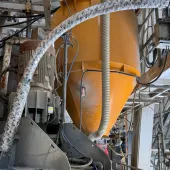Equipment sector operating below its digital potential

CECE calls for joint European approach to develop a world-class digital construction equipment industry
THE construction equipment industry is currently operating below its digital potential and companies need to adapt their organizations, further digitize their machines and operations, and promote open innovation along the way, if the industry is to remain competitive.
This was one of the key messages delegates took away from the Technical Forum during the Committee for European Construction Equipment (CECE) Summit held in Brussels on 12 October, where the issue of construction machinery digitization and the impacts it will have on industry dynamics and the OEM landscape were discussed in detail.
Experts at the event were convinced that a bigger digital transformation in the construction equipment industry will come as more building projects go digital, such as through building information modelling (BIM).
Sue Arundale, director of technical and environmental affairs at FIEC, the European Construction Industry Federation, said BIM would accelerate the deployment of smart connected construction machines and change business models considerably.
Presenting FIEC’s new group on Construction 4.0, she welcomed the invitation to join forces across the value chain. ‘Big data solutions may become a critical differentiation factor and value creation-driver in the coming years, as data banks build up and customers get increasingly sophisticated in their demands,’ she said.
‘Digitized machines will be more transparent to their customers in terms of performance, breakdowns, and costs, and OEMs must find new strategies to cope with this transparency.’
According to Geert Maes, senior manager of the Standards Department at business catalyst CEN-CENELEC, digital networking solutions must be developed and standardized to make possible a co-operative collaboration of all decentralized parties on a construction site.
He also stated that the skills and roles of operators are about to change dramatically, with the operator becoming the central co-ordinator of the process and having a need to develop completely new skills.
Lanfranco Marasso of ECSO, the European Cyber Security Organisation, highlighted the threats posed by digitization and called on businesses to incorporate cyber-safe technology into their processes, as cybercrime, he warned, had the potential to severely cripple companies.
Whilst the Summit expounded the need for the EU and its member states to create a digital framework with high-speed data lines and open standards for data exchange, delegates were also made aware of the danger of a ‘digital divide’, with some countries being significantly stronger than others in terms of digitization of the industry.
Ultimately, however, it is expected that construction and engineering costs will be reduced by 20%, thanks to better co-ordination of all input factors through digital tools.
The CECE Summit is a biennial central networking event for European construction equipment manufacturers and EU politicians. It also attracts representatives from suppliers, dealers, contractors, rental companies, and industry bodies. This year’s theme was ‘Industry and Politics: a historic transformation process’.









